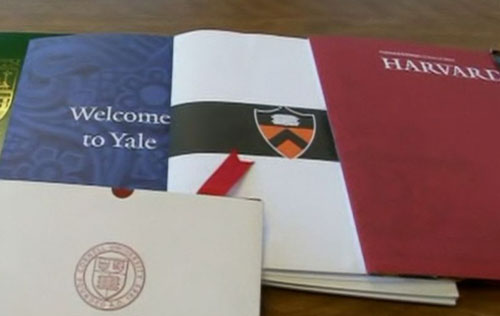by WorldTribune Staff, February 21, 2019
In his “Theses on Feuerbach,” the young Karl Marx proclaimed, “[P]hilosophers have only hitherto interpreted the world in various ways; the point is to change it” (emphasis in original).
The mission statements of several preeminent colleges and universities in the United States follow suit, an analyst noted.
 “Consider Harvard, Yale, and Princeton, three of the best-known names in higher education. Their undergraduates disproportionately ascend to the top ranks of the professions, media, and government. Their graduate students fan out to teach in colleges and universities throughout the country. What is learned at Harvard, Yale, and Princeton does not – and is not intended to – stay at Harvard, Yale, and Princeton,” wrote Peter Berkowitz, senior fellow at Stanford University’s Hoover Institution.
“Consider Harvard, Yale, and Princeton, three of the best-known names in higher education. Their undergraduates disproportionately ascend to the top ranks of the professions, media, and government. Their graduate students fan out to teach in colleges and universities throughout the country. What is learned at Harvard, Yale, and Princeton does not – and is not intended to – stay at Harvard, Yale, and Princeton,” wrote Peter Berkowitz, senior fellow at Stanford University’s Hoover Institution.
According to the formal pronouncements of those Ivy League schools, Berkowtiz wrote, “the primary purpose of liberal education is not to understand the world but to remake it.”
Berkowitz contends that “for a wholehearted embrace of liberal education these days, one must turn to avowedly Christian universities. Schools such as Liberty University (evangelical), the University of Dallas (Catholic), and Hillsdale College (nonsectarian Christian) explicitly place at the center of their missions the pursuit of wisdom through the many-sided study of Western civilization and of the principles and institutions that gave birth to constitutional government in America.”
Harvard’s mission statement states that through “exposure to new ideas, new ways of understanding, and new ways of knowing, students embark on a journey of intellectual transformation.” By means of “a diverse living environment, where students live with people who are studying different topics, who come from different walks of life and have evolving identities, intellectual transformation is deepened and conditions for social transformation are created.”
Berkowitz, who is a member of the U.S. State Department’s policy planning staff, noted that, for Harvard, “gauzy change counts for nearly everything; safeguarding and transmitting what is best in the nation and the civilization in which it is rooted count for little.”
Yale’s mission statement declares that it “is committed to improving the world today and for future generations through outstanding research and scholarship, education, preservation, and practice.” To accomplish this, Yale emphasizes, it maintains a community dedicated to free speech and diversity.
Berkowitz wrote of Yale’s statement: “Absent is any assurance that the university community also dedicates itself to the study of the history and ideas – literary, political, economic, scientific, philosophical, and religious – out of which liberal education and the culture that nourished it emerged.”
Princeton buries its mission statement in a 2016 PDF titled “Princeton University Strategic Framework.” In it, the university proclaims its “pervasive commitment to serve the nation and the world.” It seeks to further this noble aim through a liberal arts education marked by “a commitment to innovation, free inquiry, and the discovery of new knowledge and new ideas, coupled with a commitment to preserve and transmit the intellectual, artistic, and cultural heritage of the past.”
That statement is “laudable,” Berkowitz wrote. “But the university provides scant content or elaboration. It certainly does not connect preserving and transmitting the ‘heritage of the past’ to examining and carrying forward the tradition of freedom that undergirds the nation in which Princeton has flourished.”
The mission statements of outstanding small liberal arts colleges such as Williams, Amherst, and Swarthmore, Berkowitz noted, “offer similarly fuzzy endorsements of liberal education for its contribution to a morally rich and publicly spirited life. And a number of our leading public research universities – including UCLA, University of Texas, University of Virginia, University of Wisconsin – affirm their devotion to examining, preserving, expanding, and transmitting knowledge as a preparation for serving the common good. But they do not specify the core of that knowledge nor the qualities of mind and character that liberal education aims to cultivate.”
But it is Harvard, Yale, and Princeton – which Berkowitz referred to as “the paragons of progressive faith” – that “dominate the academy and set the tone for elite culture and national politics.”
“Their conversion of liberal education into social justice consciousness-raising and vocational training for political activism subverts colleges’ mission and distorts civic life. It polarizes the electorate by teaching that one partisan set of views about political society is redeeming and incontestably correct and the other is deplorable and indisputably false. It deprives students of historical knowledge and comparative frameworks, leaving them unable to assess accurately the nation’s shortcomings and appreciate its virtues. By marginalizing study of the American constitutional tradition, it impedes the formation of workable policies and viable compromises for a divided nation,” Berkowitz wrote.
“To cultivate a generation of thoughtful reformers – and preservers – it is necessary to restore a proper liberal education, one whose point is not to remake the world, but to understand it.”
Check Out Geostrategy-Direct __________ Jump Start the U.S. Media
